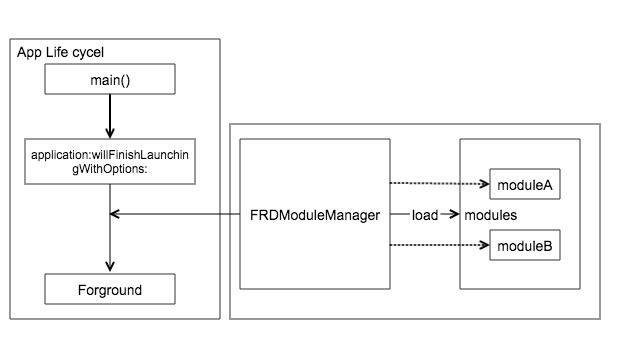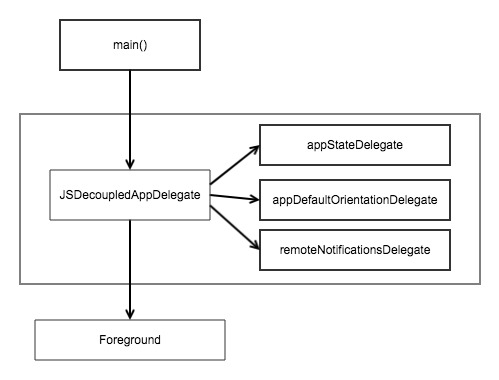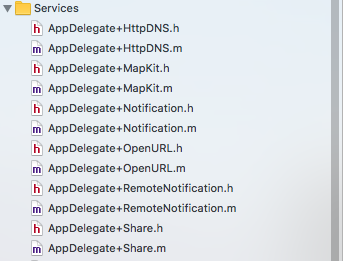AppDelegate瘦身是一个大家都很熟悉的话题,各家也有各自的解决方案。但方案无外乎两种,一种是从AppDelegate本身入手,通过各种方式减少AppDelegate的代码行数,另一种是通过架构层面就解决了。本文将分别介绍这两种方式的代表性库,并对比其优缺点。
FRDModuleManager是豆瓣开源的轻量级模块管理工具。它通过减小AppDelegate的代码量来把很多职责拆分至各个模块中去,这样 AppDelegate 会变得容易维护。其主要类FRDModuleManager只有300多行代码,使用方式也很简单:
- 加载模块
NSString* plistPath = [[NSBundle mainBundle] pathForResource:@"ModulesRegister" ofType:@"plist"];
FRDModuleManager *manager = [FRDModuleManager sharedInstance];
[manager loadModulesWithPlistFile:plistPath];
- 在 UIApplicationDelegate 各方法中留下钩子
NSString* plistPath = [[NSBundle mainBundle] pathForResource:@"ModulesRegister" ofType:@"plist"];
FRDModuleManager *manager = [FRDModuleManager sharedInstance];
[manager loadModulesWithPlistFile:plistPath];
//...这里省略其他的多个生命周期方法
实现原理:
FRDModuleManager的实现很简单,其内部数组持有注册的模块的引用,通过依次调用数组中的每个模块的特定方法来达到解耦的目的:
优点:
- 简单,只需要几行代码就可以解决。
- 被添加的每个模块都可以“享受”AppDelegate的各个生命周期。
缺点:
- 每个模块都要初始化并分配内存,当
FRDModuleManager里注册了大量模块时,会创建大量对象并影响App启动速度。 - 缺少模块初始化优先级,当有三个模块A,B,C时,正好C依赖于B,B依赖于A,如果在配置文件中配置A,B,C的顺序又是打乱时,初始化会出问题。
JSDecoupledAppDelegate是由JSBadgeView的作者开发的一款轻量级的AppDelegate解耦工具,笔者的个人项目壁纸宝贝正在使用这个库。它将AppDelegate各个功能点独立出来,并通过代理的方式将控制权下发。我们可以看到JSDecoupledAppDelegate类中有很多代理,这边列举几个:
| 代理名 | 协议 | 描述 |
|---|---|---|
| appStateDelegate | JSApplicationStateDelegate | App各种状态 |
| appDefaultOrientationDelegate | JSApplicationDefaultOrientationDelegate | App的横竖屏切换 |
| remoteNotificationsDelegate | JSApplicationRemoteNotificationsDelegate | App通知代理 |
这些代理见名知意,例如appStateDelegate是用于处理App的各种状态(didFinishLaunchingWithOptions、applicationDidBecomeActive等)下的逻辑;remoteNotificationsDelegate是用于处理App的推送的逻辑。JSDecoupledAppDelegate使用起来也非常简单:
- 将
main.m中的AppDelegate替换成JSDecoupledAppDelegate:
return UIApplicationMain(argc, argv, nil, NSStringFromClass([JSDecoupledAppDelegate class]));
- 指定你需要处理的各个
JSDecoupledAppDelegate的子delegate。例如,你需要实现didFinishLaunchingWithOptions方法,则新建一个类,在其中添加
+ (void)load
{
[JSDecoupledAppDelegate sharedAppDelegate].appStateDelegate = [[self alloc] init];
}
然后就可以在里面实现我们以前在didFinishLaunchingWithOptions的方法。
实现原理:
iOS开发的小伙伴应该对Objective-C的消息转发机制有所了解,JSDecoupledAppDelegate就是通过转发AppDelegate的各个方法来实现AppDelegate的解耦的:
优点:
JSDecoupledAppDelegate本身对于AppDelegate各个功能的拆分对我们理解AppDelegate有一定帮助——AppDelegate确实承载了太多的功能。- 由于各个子代理对象的执行顺序是确定的,因此基本可以解决
FRDModuleManager中相互依赖的问题。
缺点:
JSDecoupledAppDelegate的缺点非常明显:使用它必须废弃原生的AppDelegate,因此我们不能通过
((AppDelegate *)[UIApplication sharedApplication].delegate).window
来获取window,以及window的rootViewController。这个问题笔者曾经提issue给作者,作者的回答也是只能通过获取view.window等曲线救国的方式获取window。
创建AppDelegate分类无疑是低投入高产出的最好解决方案了。目前笔者公司的项目正在使用该方式。不需要添加任何三方库,我们就可以给AppDelegate添加很多方法,并且能轻松控制方法的执行顺序,通过此方式,我们项目的AppDelegate的.m文件文件大小成功瘦身至200行+:
然而分类的缺点也不言而喻:添加新的属性比较繁琐,只能通过runtime或者BlocksKit等三方库实现。
以上三种方法都是通过对AppDelegate修改或添加的方式来达到降低耦合的,下面介绍几种从App架构层就降低AppDelegate耦合性的解决方案。
JLRoutes是github上Star数目比较多的URL解析库,可以很方便的处理不同URL Scheme以及解析它们的参数,并通过回调block来处理URL对应的操作。我们可以通过定义URL的规则来定制我们的页面跳转或其他逻辑。例如假设我们需要在执行ServiceMediator类中的start方法,只需要
- 定义
URL,这里我们设置为
NSString *customURL = @"JLRoutesDemo://Service/ServiceMediator";
JLRoutesDemo是我们项目的URL Scheme,需要在plist中添加。
- 对我们注册的
URL进行处理:
// 在route表中添加一条记录
[JLRoutes addRoute:@"/Service/:servicename" handler:^BOOL(NSDictionary<NSString *,NSString *> * _Nonnull parameters) {
// 处理函数
Class className = NSClassFromString(parameters[@"servicename"]);
[className performSelector:@selector(startRoute)];
return YES;
}];
具体代码大家可以看笔者的Demo
实现原理:
JLRoutes在内部维护了一份URL字典,注册时添加元素,移除时删除元素。
MGJRouter是一个高效/灵活的iOS URL Router,解决了JLRoutes查找URL不够高效,通过遍历而不是匹配的问题。这里不多做介绍了,大家可以自行Google。
Objection是一个轻量级的依赖注入框架。依赖注入对于客户端开发的我们可能不太熟悉,但服务端中使用很多,比如Java的Spring框架和PHP的laravel框架。
依赖注入的核心**就是控制权反转(Inversion of Control,IoC)。传统iOS程序设计,我们直接在对象内部通过new进行创建对象,是程序主动去创建依赖对象;而IoC是有专门一个容器来创建这些对象,即由Ioc容器来控制对象的创建。具体到Objective-C中就是,先定义一个协议(protocol),然后通过objection来注册这个协议对应的class,需要的时候,可以获取该协议对应的object。对于使用方无需关心到底使用的是哪个Class,反正该有的方法、属性都有了(在协议中指定):
// 先在App启动之前初始化容器
+(void)load
{
JSObjectionInjector *injector = [JSObjection defaultInjector];
injector = injector ? : [JSObjection createInjector];
injector = [injector withModule:[[xxxModule alloc] init]];
[JSObjection setDefaultInjector:injector];
}
xxxModule就是我们需要绑定绑定protocol和具体实现类的地方,假设我们有两个服务需要启动,可以如下处理:
//xxxModule.m文件
[self bindClass:[NotificationService class] toProtocol:@protocol(NotificationServiceProtocol)];
[self bindClass:[ShareService class] toProtocol:@protocol(ShareServiceProtocol)];
接着我们只要通过如下代码获取这两个对象:
// 通知服务
JSObjectionInjector *injector = [JSObjection defaultInjector];
NSObject<NotificationServiceProtocol> *notificationService = [injector getObject:@protocol(NotificationServiceProtocol)];
// 分享服务
NSObject<ShareServiceProtocol> *shareService = [injector getObject:@protocol(ShareServiceProtocol)];
这样一来notificationService和shareService就被创建了,我们可以在这两个对象中编写我们的逻辑,省去了在AppDelegate中编写相应的代码,从而降低了耦合性。如果大家对这个库还有疑问,可以参考笔者的Demo。
本文主要讲解了通过两种方式来瘦身AppDelegate,虽然有所区别,但大致思路还是差不多的。希望对大家有所帮助。本文Demo的地址:https://github.com/zjh171/DelegateDietDemo
AppDelegate解耦之JSDecoupledAppDelegate




